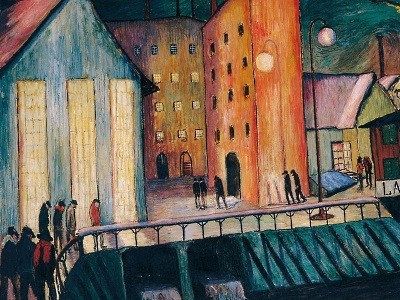Until Jesus appeared, the greatest goodness people could offer their God was moral endeavor, ethical striving, strenuous effort toward an ideal, an attempt to scrupulously obey commands and prohibitions, to repress and stifle contrary inclinations. Sometimes people even made cramped attempts to deny and mortify themselves. They felt they had to gather all their human strength for a laborious ascent or a frantic charge up a mountain where the light would not be obscured or the air polluted.
Jesus brings a righteousness that is better than that offered by any of these human strivings, because his righteousness is different in every sense from what the law of Moses and the prophets of the Old Testament were able to say. Certainly the law and the prophets contain a revelation of God’s being and God’s will. Jesus does not wish in any way to undo or obscure this incorruptible clarity (Matt. 5:17). If anyone were to act in opposition to God’s clear and definite will in a way that confuses and breaks down these moral commands and prohibitions, that person would be sinning against something sacred that God has laid in the human conscience. If people were to lose this sacred thing, they would no longer have any refuge or security when the sinister powers of lying and deceit, of hate and greed, hound them from one situation to another until finally they would plunge into the abyss.
Wherever the simple truth and purity of Jesus’ heart, the generous love of his Spirit that knows no greed, has not yet taken root, the law must take over if everything is not to be destroyed (cf. Gal. 3:19, 24; 1 Tim. 1:8–9). The government with its violence and the law with its statute books are a necessary safety valve for the witches’ brew of a chaotic, inorganic mass of people. Just as pressure would burst the steam boiler and disperse to nothing, so the opposing and scattering elements would burst, fragment, and destroy everything if the armored boiler of governmental force with the safety valves of its laws were not there.
The situation looks completely different as soon as people are gripped by God’s love. They grow toward one another and become organs of a mysterious unity, of a mystical body which, ruled by a Spirit of unity, is one heart and one soul (Acts 4:32). Here the necessity for force and coercion, for law and moral striving is canceled, because the Spirit itself rules (Rom. 8:2), which the law expressed imperfectly. The better and wholly other righteousness which Jesus brought is goodness of heart, organic strength from God, which, working through the soul, embraces a person’s whole being. It is the righteousness of humanity’s future; it no longer needs to take into account the mutual restraints and injuries that are part of our present legal relationships.
This new righteousness is unconquerable, because it is God’s goodness itself. It can be neither weakened nor changed, for it is the manifestation of a life energy that seeks to unfold everywhere and to be applied to every area of life. This justice is goodness itself, because God is good. His goodness is love; his righteousness reveals all the powers of his love. Any attempt to be righteous on the basis of legal regulations, principles, or traditions is doomed to failure from the outset. For that kind of righteousness could never be bursting, overflowing life. It could never produce anything more than laborious effort, a forcing oneself into a corset of forms that do not spring from one’s inner being.
The scribes and the Pharisees had a firm conviction, a definite moral code and an iron will. They were better than their reputation; they were respectable, devout, morally upright men who felt deeply their responsibility for their people, for customs and religion. But what they lacked was the free Spirit that blows from God. What they did not have was the gift of life from God, the life that cannot help but grow and bear fruit. What they lacked was being filled with the Holy Spirit – God himself.
God cannot be imitated. His power can be replaced by nothing. His nature cannot be fabricated. One cannot force oneself to love. The first works of the first love cannot be artificially manufactured. No intelligent reflection, no good resolution or effort of will can produce the warmth of heart that comes from God. Morals and the law are replaced by the warm life of God’s love. Jesus overcame morals and moralism by something better, by God’s own life, which can only be vaguely suggested by laws. Where Jesus lives, active love has taken the place of dead moralism.
Jesus brings a wholly different righteousness. He brings God’s goodness because he brings God himself, who tolerates nothing isolated; the living God, who wants nothing but life; the God of riches, whose being consists in giving; the God of radiating light and flooding warmth. Only those who lose themselves in God have the new righteousness. Only where this God himself lives and works does this righteousness of the warmly pulsing heart take the place of the stone tablets of the law.
Draft translation. A manuscript version can be viewed in our digital archive.
Article edited for length and clarity.


